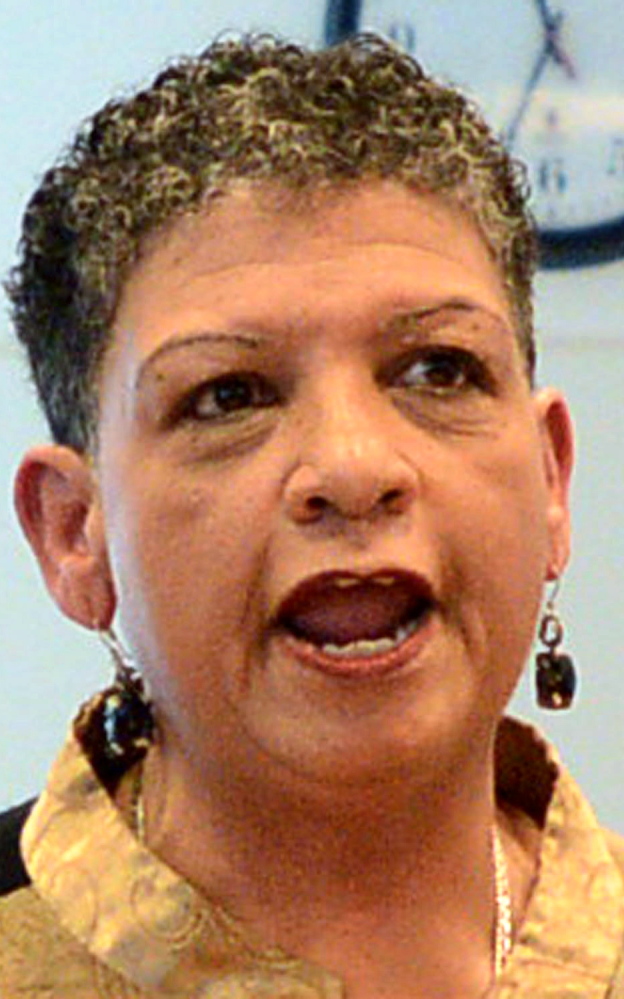BOSTON — The head of the Boston-area public transit system resigned Wednesday amid commuter frustration over service disruptions during a spate of recent snowstorms that have pounded the region.
Beverly Scott gave no specific reason for her surprise decision to step down effective April 11, seven months before her contract with the Massachusetts Bay Transportation Authority was to expire. She announced her resignation in a letter to John Jenkins, chairman of the board that oversees the MBTA, sent just hours after the board gave her a unanimous vote of confidence.
Scott said she would give priority during her final two months to restoring “normalcy” on the T after the recent disruptions, which included a complete shutdown of rail service Monday night and all day Tuesday.
But just as southern New England residents finished digging out from the latest storm, forecasters say more snow is on the way.
The region, which has already had record snowfall, saw a dusting of snow Wednesday and can expect more light snowfall Thursday just in time for the evening commute, according to the National Weather Service.
The snow should taper off early Friday morning, bringing Cape Cod up to 4 inches and around 2 inches elsewhere in Massachusetts, Rhode Island and parts of Connecticut.
Forecasters are watching a more potent storm that could dump higher amounts over the Valentine’s Day weekend. The weather service says it’s too early to say how much that might ultimately bring, but the Saturday to Sunday storm could bring “plowable snow.”
DEFENDING THE SHUTDOWN
Scott’s resignation came a day after she delivered a spirited defense of her decision to shut the system down, forcing hundreds of thousands of riders to make alternate travel plans.
“I have been around 40 years. I have been through hurricanes. I’ve been through World Trade Center bombings, tornadoes coming … 36 inches of snow, this ain’t this woman’s first rodeo,” Scott said at a news conference Tuesday.
Scott cited breakdowns in aging equipment used by the nation’s oldest public transit system, pointing to dozens of trains that became disabled during the most recent storm that dropped more than 2 feet of snow on parts of the Boston area. Boston’s subway system debuted in 1897, the first in the nation.
“No question, much more remains to be done to achieve the modern and first-class public transportation system that all want and deserve,” Scott wrote in her resignation letter.
Rail service resumed on a reduced basis Wednesday with reports of long lines, crowded trains and buses, and lengthy commutes. The problems facing the system – known in Boston as the T – have raised questions at a time when the city is bidding to host the 2024 Summer Olympics.
The MBTA board will choose a successor for Scott. Jenkins said he was “stunned” by her departure.
“Be clear, this board has had no discussions at any time about her tenure as general manager,” Jenkins said in a statement. “We hoped and expected that she would fulfill her three year contract, which ends in December of this year.”
Gov. Charlie Baker, who took office in January, had criticized the performance of the T during the storms but didn’t call for Scott to step down. Baker’s transportation secretary, Stephanie Pollack, is a member of the MBTA board and said at Wednesday’s meeting that the administration had no plans to seek a change in leadership.
Tim Buckley, a spokesman for Baker, said the governor was surprised by Scott’s resignation and only learned of it when it was announced by the board.
MAKING UP SCHOOL DAYS
Making up for lost school days has become a pressing concern for local officials and a headache for working parents.
Boston Mayor Martin J. Walsh said the city may have to consider holding classes on Saturdays or over spring break if it’s forced to cancel another day of school.
The city has seen an unprecedented 6 feet of snow this year over a 30-day period, breaking a record set during the epic Blizzard of 1978, and has canceled school on eight days.
Boston has already extended the school year to June 30 and expects to hold classes on two Suffolk County holidays: Evacuation Day on March 17 and Bunker Hill Day on June 17. Suffolk County encompasses Boston and three suburbs.
“If we miss one more school day, we’re in different territory,” Walsh said Tuesday at a City Hall briefing. “We have no place to make it up.”
Jeff Mulqueen, superintendent of the Pentucket Regional School District, which covers three Massachusetts communities near the New Hampshire state line, says he’ll be developing a plan to make up for lost class time after shutting down the district for the rest of this week.
“The winter is not over and we are considering ways to be proactive,” Mulqueen said, noting the district has already shifted the last day of school to June 29 for high school students and June 25 for elementary and middle school students. “All possible options are being considered. That includes holidays, Saturdays, April vacation, and nontraditional alternatives.”
Not all school districts are in the same boat: A number of communities start school in the middle of August, giving them the ability to add more days to the end of the school year.
Send questions/comments to the editors.



Success. Please wait for the page to reload. If the page does not reload within 5 seconds, please refresh the page.
Enter your email and password to access comments.
Hi, to comment on stories you must . This profile is in addition to your subscription and website login.
Already have a commenting profile? .
Invalid username/password.
Please check your email to confirm and complete your registration.
Only subscribers are eligible to post comments. Please subscribe or login first for digital access. Here’s why.
Use the form below to reset your password. When you've submitted your account email, we will send an email with a reset code.